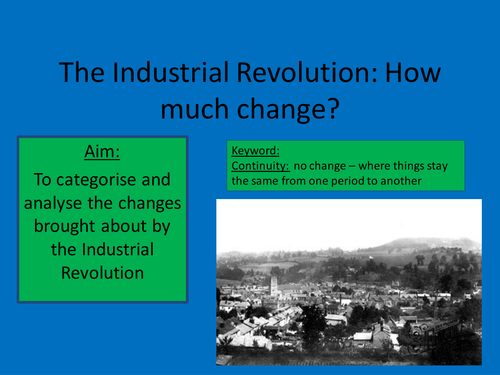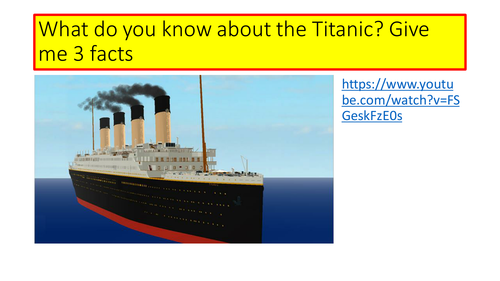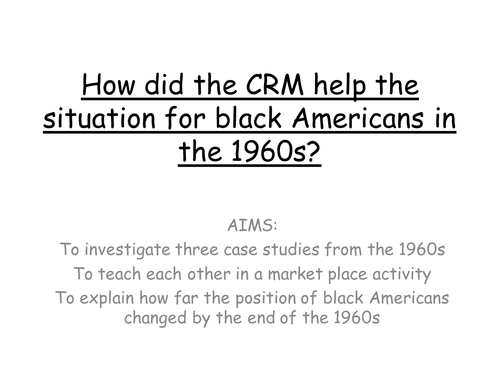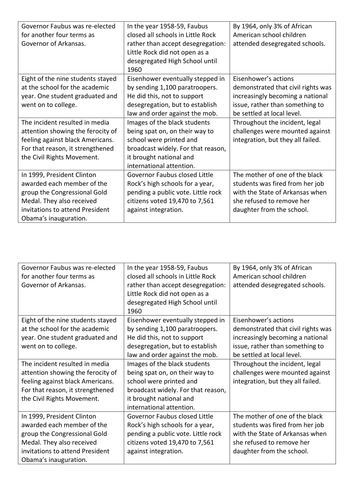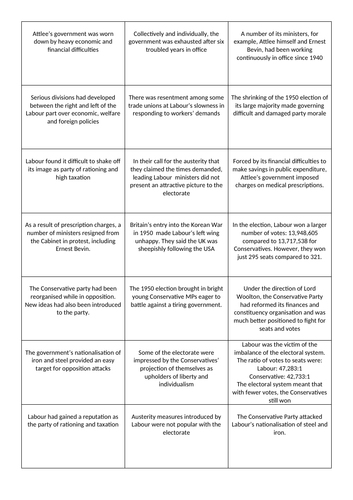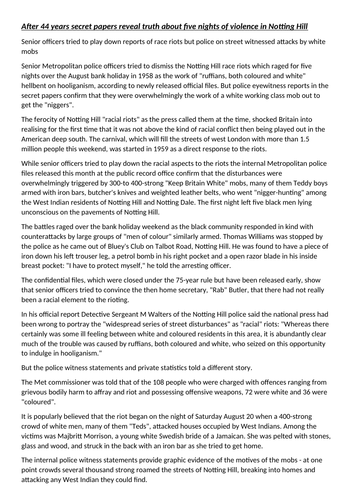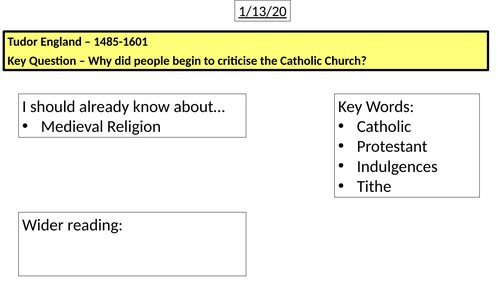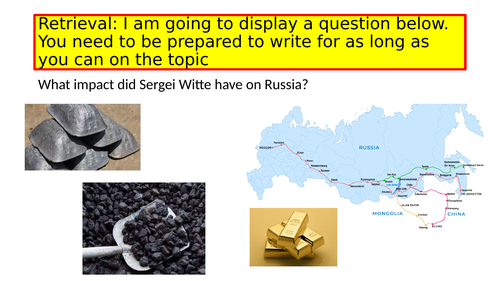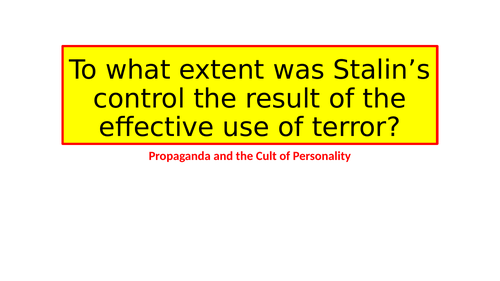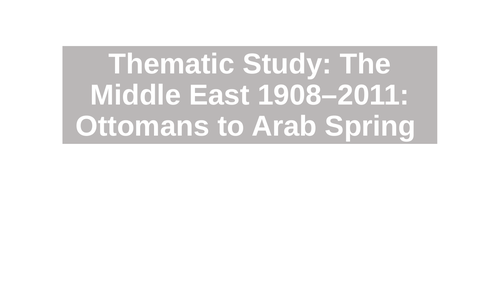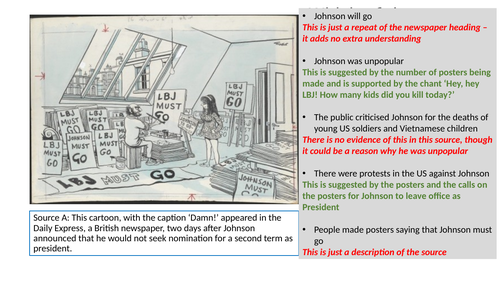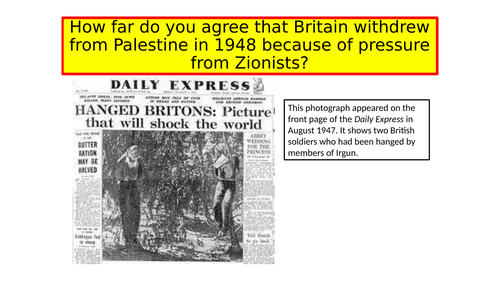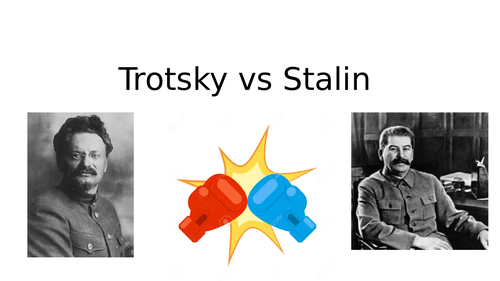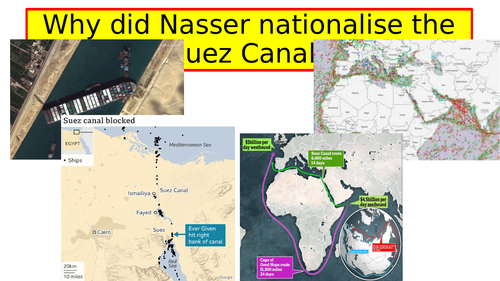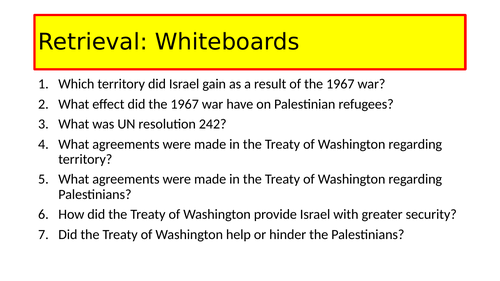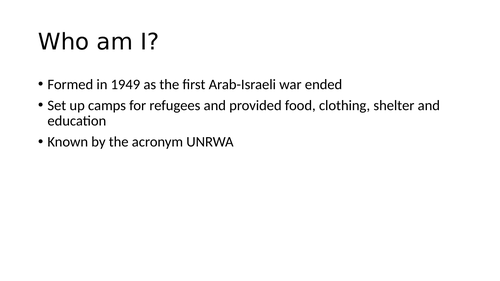
170Uploads
40k+Views
18k+Downloads
All resources

Industrial Revolution - What changed?
This lesson works well as an introduction to the industrial revolution or a summary of the changes that take place. Students will categorise the changes and evaluate the extent of change. Includes differentiated resources for higher and lower ability students

The Titanic - Why did so many people die: an investigation
A KS3 lesson in which students will investigate why so many people died on the Titanic. Students will consider the role of various factors, including attitudes to class and reach a judgement on the most significant reason. Students will be required to categorise, interrogate and collect evidence.

Civil Rights Movement - protest in the 1960s
A 2 lesson series in which students consider the effectiveness of methods of protest in the 1960s: freedom rides, freedom marches and the black power movement. Includes a variety of activities which students can complete in a carousel across 2 lessons.

Civil Rights Movement - Consequences of Little Rock
A follow up lesson in which students examine the consequences of Little Rock and therefore its significance for the Civil Rights Movement. This lesson will also act as a summary in which students consider the progress made by the CRM by the end of the 1950s.

Making of Modern Britain - 1951 Labour defeat
An A-level lesson in which students understand the reasons for Labour’s defeat in the 1951 election, providing valuable contextual knowledge for the beginning of the course in 1951. Students will be required to categorise their reasons and begin supporting their arguments.

AQA 7042 Making of Modern Britain - Race Riots
An A-level lesson looking at the underlying causes, events and consequences of the Notting Hill Race Riots, in which students carry out an investigation and report back on their findings. Uses a range of sources and historical extracts to support their learning.

Why did people criticise the Catholic Church?
A KS3 lesson which introduces the split between Catholics and Protestants before students study the Reformation in England. Students will consider why people began to criticise the Catholic Church before writing their own version of Luther’s 95 theses to demonstrate their understanding.

Russia 1894-1941: Opposition to Nicholas II
An A-level lesson in which students evaluate the threat posed by the four main opposition groups to Nicholas II at the start of his rule. Students will use criteria such as popularity, how revolutionary, how united to reach an overall judgement on the significance of the threat each group posed, and will record their findings in top trumps cards to allow direct comparisons. Students can work in groups and teach each other, or independently. Students will finish by reaching a judgement on the group that posed the greatest threat, similar to the skills required in the short essay question.

Russia - 1905 Revoultion
An A-level lesson in which students examine the events of 1905. Students will create a living graph to show the anger felt by Russians, along with the level of threat posed to the Tsar. Students will examine evidence to conclude whether the events of 1905 deserve to be known as a revolution or not.

Russia: Witte's economic reforms
An A-level lesson in which students prepare a response to the essay question: ‘How far did Witte succeed in his plans to reform Russian industry in the years 1893-1903?’.
Students will use a card sort to organise their paragraphs and to form their argument. Students will use the main activities to put together an essay plan to answer the question. The essay plan provides structured support for students who may need it. They will finish by reaching judgements on essay questions on the same topic with different wording so that students can learn to focus their argument on the question specifically.

Russia - Lenin's legacy
An A-level lesson in which students analyse and evaluate the impact of Stalin on Russia. Students will progress through tasks which enable them to consider successes and failures, before categorising and prioritising their information to form the basis of an essay plan. Students will reach a judgement on an essay question about Lenin’s greatest achievement. Works well to consolidate their understanding on Lenin’s rule as it offers an opportunity to recap many of the key ideas.

Russia - success of War Communism and NEP
A lesson in which students review their learning on War Communism and NEP to consider the more successful policies. Students will analyse success by considering their achievement according to criteria such as unity in the Bolshevik party, and increasing agricultural production. Students are required to reach judgements as to which policy was better according to each before reaching an overall conclusion about which was better for the Bolshevik party. This enables students to consider success from a different perspective beyond economic success.

Russia - Stalin's propaganda
An A-level lesson in which students assess the role of propaganda in Stalin’s consolidation of power. Students will consider the images of Stalin presented in propaganda, and its role in helping Stalin to consolidate his power. Having already studied economic policies and terror, students will draw links between propaganda and these other methods of consolidating power, to show how they are used in conjunction to strengthen Stalin’s position.

Introduction to the Middle East (Y321)
An A-level lesson for the OCR Y321 on the Middle East. This lesson is intended to act as an introductory lesson to allow students to gain an overview of some of the key events and therefore provide some contextual knowledge. Students will use the card sort and picture matching activity to produce a timeline of key events, and begin to consider the themes from the course by considering some key questions.

Vietnamisation - how successful?
A lesson for GCSE students studying the Vietnam war. Includes exam practice skills including for source questions (AQA 4 mark question) and write an account questions. Students will consider the circumstances under which Nixon decided on Vietnamisation, understanding why other options were not taken. They will create success criteria, so that they are able to analyse the successes and failures of the policy. Finally, with a focus on the write an account question, students will be required to put events into chronological order to form a narrative.

British withdrawal from Palestine, 1948 (Y321)
An A-level lesson based around the question: How far do you agree that Britain withdrew from Palestine in 1948 because of pressure from Zionists?
Students will use their existing knowledge to examine the role of long term causes such as the mandate and failure of British policy before examining short term causes during and after the Second World War. Students will categorise causes to create three key factors and detail evidence, explain the consequences, and analyse their causal role in the British decision to withdraw.

Russia - Stalin's defeat of Trotsky
An A-level lesson looking at how Stalin defeated Trotsky in his rise to power. Students will compare the relative strengths of Stalin and Trotsky by completing a set of Top Trumps cards (included in the PowerPoint) in order to evaluate the relative strengths of the two leadership contenders. Students will reach judgements on their strengths in areas such as their positions within the party, their ideology and their ability to position themselves as Lenin’s successor. Ultimately, students will reach judgements on the roles of Stalin and Trotsky in the outcomes, and compare the relative importance of a range of factors. Includes a retrieval task from their previous learning.

Why did Nasser nationalise the Suez Canal?
An A-level lesson for OCR Y321 on the chain of events leading to the nationalisation of the Suez Canal. Students will understand the chronology and the competing aims of the Western powers versus Egypt.
Students will complete a chronology card sort and use these to understand the competing aims of Western powers and Egypt surrounding the Suez Canal. Students will explain attempts taken by Nasser to exert Egyptian independence and how they competed with Britain’s attempts to hold on to influence in the region. Students will finish by reaching a judgement on the motivations behind Nasser’s decision to nationalise the Suez Canal.

Middle East - first Intifada Y321
An A-level lesson for OCR Y321 focused on the theme of Zionism, Israel and the Palestinian Issue. Students will consider the causes and consequences of the first Intifada by considering the role of Jewish settlements in occupied territories, and the significance of the Intifada for the Palestinian issue. Students will have the opportunity to compare the significance of this event to those they have already studied and begin to consider where the greater turning points are.

Israeli-Palestinian peace-making 1990s
An A-level lesson designed for OCR Y321 in which students will consider the factors influencing the successes and failures of the Israeli-Palestinian peace process in the 1990s. Students will use a card sort to put key events into chronological order to gain an understanding of the narrative. From this students will pick out the factors helping and hindering the peace process. The lesson is linked to the essay stem: ‘Zionism was the most important influence on attempts to resolve the Palestinian issue’ and will prepare how the 1990s supports and challenges this statement. Students are also given the opportunity to bring in their existing knowledge to consider how the factors at play in the 1990s were also apparent in the preceeding events so that they begin to draw comparisons and form a synthesis across the period as a whole.

